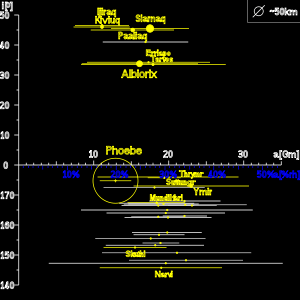Saturn's Inuit group of satellites
The Inuit group is a dynamical grouping of the prograde irregular satellites of Saturn which follow similar orbits. Their semi-major axes range between 11 and 18 Gm, their inclinations between 40° and 50°, and their eccentricities between 0.15 and 0.48.

Classification
The diagram illustrates the Inuit group in relation to other irregular satellites of Saturn. The eccentricity of the orbits is represented by the yellow segments (extending from the pericentre to the apocentre) with the inclination represented on Y axis.
The five members of the group are (in order of increasing distance from Saturn):
The International Astronomical Union (IAU) uses names taken from Inuit mythology for these moons.
The group appeared quite homogenous in early observations, the satellites displaying light-red colour (colour indices B−V = 0.79 and V−R = 0.51, similar to that of Gallic group)[1] and similar infrared spectra.[2] Recent observations however, revealed that Ijiraq is distinctively redder than Paaliaq, Siarnaq and Kiviuq. In addition, unlike the other three, Ijiraq's spectrum does not display a weak absorption near 0.7 μm. This feature is attributed to a possible water hydration .[3]
The spectral homogeneity (with the exception of Ijiraq) is consistent with a common origin in the break-up of a single object but the dispersion of the orbital parameters requires further explanation. Recently reported secular resonances among the members could provide the explanation of the post-collisional dispersion.
References
- ↑ Grav, Tommy; Holman, Matthew J.; Gladman, Brett J.; Aksnes, Kaare Photometric survey of the irregular satellites, Icarus, 166,(2003), pp. 33–45. Preprint
- ↑ Tommy Grav and Matthew J. Holman Near-Infrared Photometry of the Irregular Satellites of Jupiter and Saturn,The Astrophysical Journal, 605, (2004), pp. L141–L144 Preprint
- ↑ Tommy Grav and James Bauer A deeper look at the colors of Saturnian irregular satellites, Preprint
External links
Mean orbital parameters: from JPL
| ||||||||||||||||||||||||||||||||||||||||||||||